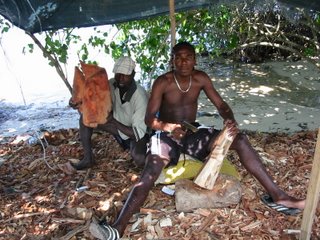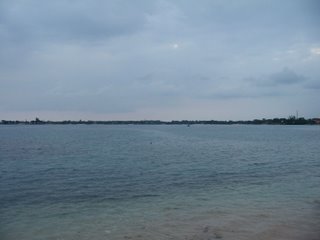
Missed parts one and two? Don't worry, they're here:
Jamaica, yo problem, part one: The island by foot
Jamaica, yo problem, part two: The island by car
Crossposted on Pajamas Media.
Having miraculously survived the drive to Negril and back, my wife, daughter and I headed out to Ocho Rios from Montego Bay, a distance of 67 miles for our second day of Jamaica behind the wheel.
It couldn't take too long to get there, could it?
We managed to drive about five miles from "Mobay," before a policemen, backed up by a second cop with an M-16 rifle draped over his shoulder, motioned us to pull over.
I later found out such random stops are common, but who knows? Maybe I damaged a curb while driving the day before?
We stopped on the side of the road, the first cop looked at us, asked us where we were going, then said we could continue on. But he told us "to be careful."
After what I went through during my drive the day before, I intended to do just that.
Just as on the way west to Negril, the roads were pretty awful at least until the town of Falmouth. There, the North Coast Highway became an American style multi-lane highway. Perfect.
But that just lasted just a few miles. Then the North Coast Highway became a gravel road--a graded surface awaiting asphalt--but still unpaved.
It's not done yet. Then road "improved" to a pothole pocked ribbon of (mostly) concrete...then it was a gravel again with an occasional blessing of a patch or two of real highway.
You won't find any mention of the poor road conditions in the Jamaica tourism books, such as the one I purchased, Frommers' Jamaica,
While we were in Jamaica, there was a convention to pick the successor to retiring Prime Minister P. J. Patterson
Here's what Jamaica Gleaner columnist Dawn Ritch had to say about Patterson:
Patterson said roads would be his legacy. Yet, he has been building a northcoast highway for several years that is way over budget by about three times, and way behind schedule. A pregnant woman recently had to be taken to hospital in a wheelbarrow from Cascades, because the access road broke away two years ago and the Government couldn't bother to fix it. Roads will have to be the legacy of somebody else, not the Most Honourable.
That's not the only problem Patterson's successor faces, as Ritch continues:
In a sham policy to bolster the net international reserves and to spend on massive public sector projects, the Prime Minister and his Finance Minister have borrowed overseas at commercial rates. This was done in order to avoid the International Monetary Fund (IMF) and the World Bank which lend at much cheaper rates. Only profligate governments borrow at commercial rates. Institutional support at cheaper rates is always available for developing countries, but it comes with restraints.
Jamaica, yo problem!
A quick flashback to Montego Bay: During a walk to the end of Gloucester Street, "the Hip Strip," I met a man who said he lived in Philadelphia for 16 years, he called himself the "King of America." After I told him I was from Chicago, he said he'd been there and visited Louis Farrakhan's mosque at 73rd and Stony Island on Chicago's South Side. (He got the address right.) He offered to give me a personal tour of the "slums of Jamaica." He said to look for him at the Pork and Knockers II bar, his hangout, to finalize the arrangements. I had planned to take "the King" up on the offer, but after two days of driving on Prime Minister Patterson's North Coast Highway, I could only imagine the decrepit condition of the "slum roads."
 East of Falmouth, we met Cornell Benton and Brenton Neisch, pictured here. As with the towns west of Montego Bay, the individuals we met east of there were much friendlier, and not interested in trying to "hustle us," as they do in Mobay.
East of Falmouth, we met Cornell Benton and Brenton Neisch, pictured here. As with the towns west of Montego Bay, the individuals we met east of there were much friendlier, and not interested in trying to "hustle us," as they do in Mobay.We had two goals in Ocho Rios. The first was to visit Dunn's River Falls, the second was to fulfill a promise to our daughter: A swim with the dolphins at Dolphin Cove.
Because it took us almost three hours to travel the 67 miles to Ocho Rios, we decided to head to Dolphin Cove first.

"Little Marathon Pundit" had her dolphin swim, and as you can see, she had a blast. Unless you're a PETA member, I highly recommend it. (But the cost of the swim is steep: $185 US.)
Dunn's River Falls closes at 5:00PM, we got there at 4:50PM--they wouldn't let us in so close to closing time.
Time to head back to Montego Bay.

That's Discovery Bay at twilight on a cloudy day. It's where Christopher Columbus, the first European explorer to reach Jamaica, anchored in 1494. There's a small park there honoring the famous Italian. But the legacy of Columbus is viewed differently in Jamaica than it is in the United States.
From Frommers' Jamaica:
In 1513 the first African slaves reached Jamaica, and in 1520 sugarcane cultivation was introduced. In the 1540s the Spanish Crown grudgingly offered the entire island to Columbus's family as a reward for his service to Spain. Columbus's descendants did nothing to develop the island's vast potential, however. Angered by the lack of immediate profit (abundantly available from gold and silver mines in Mexico and Peru), the Spanish colonists accomplished very little other than to wipe out the entire Arawak population. Forced into slavery, every last Arawak was either executed or died of disease, overwork, or malnutrition.
Night came for us, and it began to rain. Then the road disappeared. Well, it seemed that way. Even the finished portions of the North Coast Highway seemingly have no drainage system. The old portions of the highway, and of course the gravel sections of the roadway certainly don't have one.
It was raining hard. At least we were in a car. Jill Dolan, a friend-of-the-blog from Park Ridge, Illinois told me she and her husband rented motorcycles and got caught in a rainstorm on that same highway. They took shelter in a church, a structure with two and a half walls and a few boards for a roof. The "pastor" demanded cash from them for use of the shelter.
Since I couldn't see the road--there was too much water--it was a struggle to stay on the road. By some miracle, I avoided driving into one of those car-eating potholes I viewed on the way to Ocho Rios, but I did find myself driving--against traffic--on the right, that is the wrong side of the road--during the deluge. I couldn't find the left side in the muck, so I honked the horn like a maniac--and the oncoming traffic yielded. A very close call.
Finally, we made it back to Montego Bay. The streets of Mobay had turned into small rivers from the rain--with rocks, mud, and garbage sprinkling the streams. If Montego Bay has a street drainage system, it doesn't work too well.
We made it back to our hotel safe and sound--and without smashing our rental car.
My nerves and blood pressure still may not have recovered from the experience.
Now I know why street "ganja" sales are so prevalent in Montego Bay. The sellers are only trying to calm the nerves of tourists.
In part one of Jamaica, Yo Problem I wrote of the increasing popularity of the all-inclusive resorts on the island, such as Sandals. Resort shuttle buses take the guests around--tourists don't have to drive. Considering the roads, and the persistent haggling--as well as the "Mobay hustle--that occurs in Montego Bay, the appeal of the all-inclusives are is clearly obvious.
As I stated several times before, the goal of this series is to ignite a "Travel flogging" boom. I hope it happens.
Technorati tags: Jamaica Vacation Caribbean road trip Ocho Rios Montego BayTravel Christopher Columbus
No comments:
Post a Comment